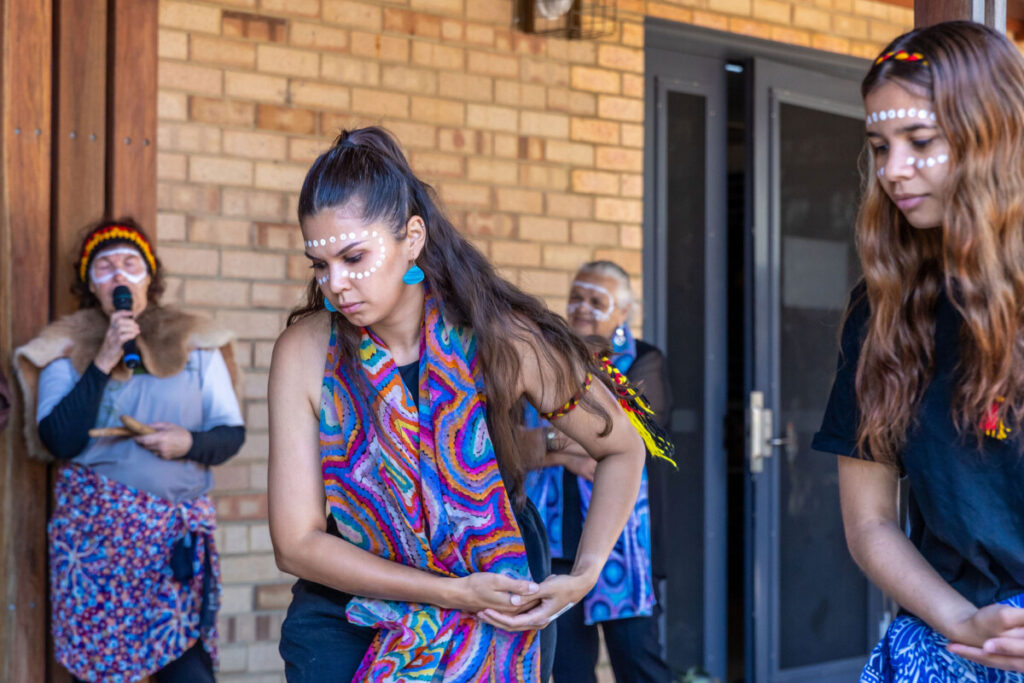Welcoming local babies | Demand growing for important cultural tradition
A modern revival of an ancient tradition practised widely in Indigenous communities across Australia is playing an important role in reconnecting people with their culture in Armadale.
Welcome Baby to Country is an acknowledgement of an infant’s connection to the traditional lands on which they are born, and a celebration of their birth.
Nearly 50 little ones – Indigenous and non-Indigenous alike – were welcomed to Whadjuk Boodja at the Champion Centre on Friday with a special smoking ceremony.
Ethel was there to watch her baby grandson, Marcel, be welcomed.
“It’s ground-breaking to be bringing this back here for our younger generations,” she said.
I didn’t have the chance to do this for my own children, so I’m very happy that this tradition has come back.
Marcel’s mum, Kelsey, said her childhood in New Zealand, where she was immersed in Māori culture, informed her desire for her son to be rooted in his own culture.
“I hope it becomes normalised here,” she said.
“In New Zealand, everyone makes an effort to learn the Māori culture.
“I think the more the culture gets embraced here, the better it’s going to be for the future of it.”
When the City of Armadale’s Champion Centre hosted its first Welcome Baby to Country last June, it was the only one of its kind in Perth.
Friday’s ceremony was the fourth one held and the demand has been growing steadily, with families from as far away as Mandurah and Yanchep coming to have their baby welcomed to country.
The revival has sparked curiosity from far and wide, including from several universities. And the Champion Centre’s Welcome Baby to Country story was featured at the recent ‘Boorna Waanginy: The Trees Speak’ immersive light experience in Kings Park.
The initiative was driven by local Elder Vivienne Hansen (Aunty Viv) and her goal to provide a space to host cultural connection for young families and continue traditional practices.
“As a Nyoongar woman my heart is truly grateful we’re meeting here today on Whadjuk Boodja,” Aunty Viv said.
“Our heart and spirit is deeply buried in this land.
And through our Nyoongar language and Nyoongar knowledge we stand strong.
Aunty Viv explained that practices differ all over the country, but that special medicinal plants are often used in traditional ceremonies, with the smoke and ash acting as protection for the babies.
Babies are also often traditionally wrapped in kangaroo skins or possum pelts and given a name during the ceremony.
In a modern twist to the naming convention, each baby at the Champion Centre is presented with a personalised certificate that depicts the Nyoongar season in which they were born.
And Aunty Viv said she’s hopeful of finding a way to eventually incorporate the kangaroo skins into the Champion Centre’s ceremonies.
At Friday’s event members of the Middar Yorgas (Grandmothers/Aunties) Dance Group performed traditional cleansing and berry picking dances before welcoming the little ones to join them on stage for some freestyle movement.
“This is our favourite event to attend because our babies are our future,” one of the performers said.

The joy at the gathering was palpable.
Simone said she was “super excited” to have her new baby Koa part of the ceremony, after her daughter Isabella was welcomed at the inaugural ceremony.
For her, these events are a way to find her way back to her culture.
“Every time I listen to Unc speak in Nyoongar and we walk through the smoke there’s an instant connection to country, to our culture,” she said.
“I don’t know how to describe it, but it’s just there.
The more that Indigenous and non-Indigenous people experience and connect through this culture, the more it’ll bring us together.
“Look at how diverse it is here today – it’s magic.”
The Champion Centre plans to host two Welcome Baby to Country events in 2025. More information including events and updates can be found on their Facebook page.
– Mal Dee, Examiner Newspapers